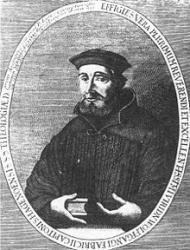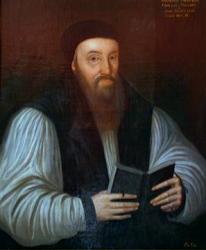Planning worship?
Check out our sister site, ZeteoSearch.org,
for 20+ additional resources related to your search.
- |
User Links
Search Results
Give peace in these our days, O Lord
Appears in 4 hymnals Used With Tune: DA PACEM
Give peace in these our days, O Lord
Give peace in these our days, O Lord
Hymnal: American Hymns Old and New #19 (1980) Languages: English Tune Title: DA PACEM
Give peace in these our days, O Lord
Give Peace in These Our Days
Author: Wolfgang Köpfel; Edmund Grindal Hymnal: The Cyber Hymnal #1810 Meter: 8.7.8.7 D First Line: Give peace in these our days, O Lord Lyrics: 1. Give peace in these our days, O Lord,
Great dangers are now at hand;
Thine enemies with one accord
Christ’s name in every land
Seek to deface, root out and rase,
Thy true right worship indeed.
Be Thou the stay, O Lord, we Thee pray.
Thou helpest alone in all need.
2. Give us that peace that we do lack,
Through misbelief, and in ill life.
Thy Word to offer Thou dost not slack,
Which we unkindly gainstrive.
With fire and sword, this healthful Word
Some persecute and oppress.
Some with the mouth confess the truth
Without sincere godliness.
3. Give peace and us Thy sprite down send
With grief and repentance true;
Do piece our hearts our lives to amend,
And by faith Christ renew;
That fear and dread, war and bloodshed,
Through Thy sweet mercy and grace,
May from us slide, Thy truth abide,
And shine in every place. Languages: English Tune Title: DA PACEM
Give Peace in These Our Days
Thomas Ravenscroft
1592 - 1635 Composer of "DA PACEM (Ravenscroft)" Thomas Ravenscroft United Kingdom 1592-1635. Born at Sussex, England, he allegedly sang in the choir at St Paul’s Cathedral. He attended music lectures at Gresham College. He was educated at Cambridge College, graduating in 1607. From 1618-1622 he was music master at Christ’s Hospital. Many of his works were aimed at pleasing a middle class lay public. He collected folk music: “Pammelia” (1609), “Deuteromelia” [includes the song “Three blind mice”](1609), “Melismata” (1611). He also published a metrical Psalter (the whole book of Psalms) in 1621. He composed 11 anthems, three motets, and four fantasies. He also wrote two treatises on music theory: “A briefe discourse of the true (but neglected) use of charact'ring the degrees” (1614), and “A treatise of musick”. He was an author, compiler, composer, editor, arranger, musician, bibliographer, contributor, antecedent, lyricist and creator. No informaton found regarding family. He died at London, England. 672 works. A reprint of his “Psalms” was published in 1844 by Canon Havergal.
John Perry
Thomas Ravenscroft
Wolfgang Capito

1478 - 1541 Person Name: Wolfgang Köpfel Author of "Give Peace in These Our Days" in The Cyber Hymnal Also known as Wolfgang Köpfel
Capito, Wolfgang, son of Hans Köpfel or Kopphel, farrier and counsellor at Hagenau, in Alsace; was born at Hagenau in 1478. At Freiburg, in Breisgau, he studied medicine (M.D. in 1498); then law, and, after his father's death, theology. In 1512 he was appointed preacher at the Benedictine Collegiate Church of Bruchsal. He subsequently held important appointments at Basel, Mainz, and Strassburg. At Strassburg, under the influence of Zell and Bucer, he openly declared for the Reformation, became a freeman of Strassburg, July, 1523, and on Aug. 1, 1524, married the daughter of a Strassburg burgess. Working hand in hand with Bucer, he acted as mediator between the Zwinglians and the Lutherans, and after Zwingle's death he drew up for the Swiss churches a form of church government and worship. He died at Strassburg during the pestilence in the beginning of Nov. 1541 (Koch, ii. 94-101; Allg. Deutsche Biographie, iii. 772-775, the latter dating his birth 1472).
He was a good musician and a lover of poetry. Three hymns are known as by him, two of which are based on the Latin. The only one translated into English is noted under “Da pacem " (q.v.). [Rev. James Mearns, M.A.]
--John Julian, Dictionary of Hymnology (1907)
Wolfgang Capito
Edmund Grindal

1519 - 1583 Translator (from German) of "Give Peace in These Our Days" in The Cyber Hymnal Edmund Grindal, (born 1519?, St. Bees, Cumberland, Eng.-—died July 6, 1583, Croyden, Surrey), English archbishop of Canterbury whose Puritan sympathies brought him into serious conflict with Queen Elizabeth I.
Educated at Magdalene and Christ’s colleges, Cambridge, he became a royal chaplain and prebendary of Westminster in 1551 and, during the reign of Mary I, went to the Continent on diplomatic missions relating to religious affairs. On the accession of Elizabeth I he returned home and the following year was nominated bishop of London, but he hesitated to accept because of his scruples about the “ornaments” rubric in the Elizabethan prayer book, the vestments of the clergy, and the use of wafer bread for Holy Communion. He consulted Peter Martyr, who advised acceptance so that they might work from within for the removal of the remaining relics of popery. As bishop of London Grindal was a thorn in the side of Archbishop Matthew Parker, who wished to enforce the wearing of the surplice but enjoyed little support from Grindal.
In 1570 Grindal was made archbishop of York, and he became a determined opponent of Thomas Cartwright and the Presbyterianizing party, which desired the abolition of the prayer book and of episcopacy. Accordingly he was nominated to the archbishopric of Canterbury in 1576 in the hope that he might drive a wedge between the moderate Puritans and the new party of radical reform. He introduced a series of moderate reforms of abuses, which might have been effective 10 years earlier. Unfortunately he fell foul of Elizabeth in regard to “prophesyings,” or meetings of clergy for mutual edification and study, since he wished to regulate and continue them, whereas she wished to prevent their meeting. Grindal thereupon addressed to the Queen a remonstrance, in which he pointed out to her the limits of her authority in ecclesiastical matters and exhorted her to respect that of the bishops, in terms as unaccustomed as unwelcome to Elizabeth. She retorted by imprisoning him and by suspending him from the exercise of his metropolitan functions. The dispute dragged on until his death.
--www.britannica.com/
Edmund Grindal


 My Starred Hymns
My Starred Hymns


